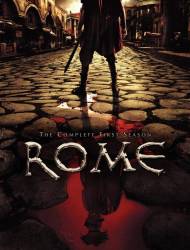Factual error: The verse Octavia recites is from Virgilius' poem "the Aeneid". That poem was written at least a quarter of a decade after the death of Caesar.
Factual error: Vercingetorix was indeed displayed publicly in Caesar's triumph, but he was executed afterwards, not during the triumph itself.
Factual error: Caesar was not murdered on the Senate floor, as depicted in the series. That was the conspirators' plan, but when they learned that Mark Anthony was coming to meet Caesar, they instead lured Caesar into the portico of Pompey's theatre and killed him there.
Suggested correction: The reason the senate was meeting in a different place is because the Senate house had been burned down a little while before so they met elsewhere during its reconstruction.
Factual error: At Atia's house, Pompey bores his hostess with stories about how he fought the Parthians. The real Pompey fought against Pontus, Armenia and the Seleucids of Syria, but never against Parthia.
Factual error: The 13th legion's symbol was a lion, not a boar as depicted in the series.
Factual error: At the beginning of this episode, Pompey and Cato talk about the battle against 'the Illyrian pirates'. There were no 'Illyrian pirates' in Pompey's days. Those pirates had already been wiped out during the Illyrian Wars of 229 and 219 BC. The pirates Pompey did fight were from Cilicia, in the south of present-day Turkey.
Factual error: Brutus proposes that Caesar be made imperator. The word imperator would come to mean emperor during the age of the Roman Empire, but it did not have that meaning during Caesar's time. Imperator was a military title which Caesar had been given long before the events in this episode. Even if the word is used with its current meaning it's an error, as Caesar never became an emperor. The word Brutus would have used is dictator.
Factual error: The future emperor Augustus is called Octavian, an English modification of Octavianus. However, before being adopted by Caesar (which happened after Caesar returned from Egypt) his name was Octavius. When he was adopted he took the name Gaius Julius Caesar Octavianus, and at that point the English version of his name is Octavian, but before the adoption he did not have that name. On the show they are thus calling him by a name he did not have at the time.
Factual error: The eagle was the standard of each legion, not Caesar's personal standard as stated in the series, even by Caesar himself (to Brutus). Also, the Aquilifer (eagle bearer) was traditionally bareheaded - unlike the other standard bearers, he did not wear a bearskin or a helmet.
Factual error: Octavian was not in Rome when Caesar was murdered.
Factual error: In this episode they make comments on how traitors will go to Pluto, meaning it in the sense that they will end up in hell. Pluto was not equal to hell; everyone who died went to Pluto.
Factual error: Cicero's secretary, Tiro, is seen throughout the series wearing a plaque around his neck marking him as a slave, and here Cicero tells him, "You've been freed in my will". However, Tiro was freed in 53 BC, several years before the events depicted in the series.





